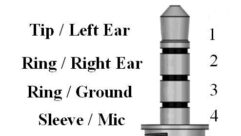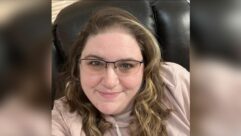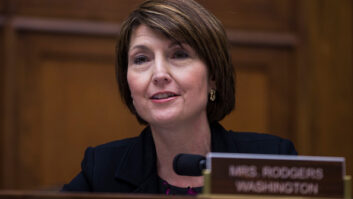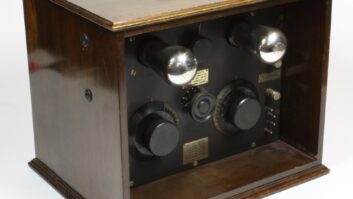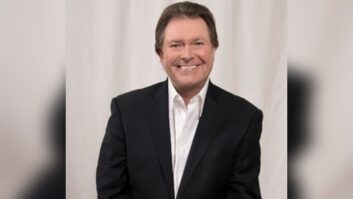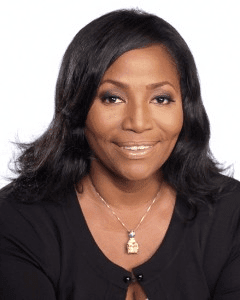
Melody Spann Cooper is chairman of Midway Broadcasting Corp., which describes itself as an African-American-owned media boutique whose properties include WVON(AM) and WRLL(AM). In this Q&A, she discusses her unique challenges for women in broadcast, building and keeping a deep pool of talent, social media’s impact and more. She was interviewed by Suzanne Gougherty, director of MMTC Media and Telecom Brokers at the Multicultural Media, Telecom and Internet Council. MMTC commentaries appear regularly in Radio World, which welcomes other points of view on industry issues.
Suzanne Gougherty: What prompted you to begin a career in broadcasting? What was your first position?
Melody Spann Cooper: I began my career in broadcasting as a rambunctious teenager whose dad was trying to keep me off the mean streets of Chicago, so the radio station became a safe haven. My dad and his business partner Wesley South had recently acquired the station in which they built their radio careers. My first job, at 14, was answering request lines every weekend. I eventually moved up to receptionist, traffic/continuity director, on-air talent, news anchor, assistant PD, PD, vice president, president, then chairman.
Gougherty: Who was your primary mentor?
Spann Cooper: I had two: my dad who was an incredible unconventional visionary, and his partner, Wesley South, who had solid managerial skills. I had the best of both worlds.
Gougherty: As an owner/operator, what are the most important situations you face on a daily basis?
Spann Cooper: Closing advertising deals. Radio is beginning to reset from suffering attrition due to digital. Imagine having a conversation with a 25-year-old buyer about my 56-year-old station. It’s a hard sell. It takes a while to get them from a “fast no” to a “slow yes,” but I’m up for the challenge.
[How a Broadcast Multiple List Website Got Started]
 Gougherty: Being in a major metro —Chicago — what keeps you awake at night?
Gougherty: Being in a major metro —Chicago — what keeps you awake at night?
Spann Cooper: What keeps me awake at night….Nothing! Chicago is an active town that keeps you fully engaged if you are in business. Closing business deals and being active civically make for 12-hour days most often. I’m exhausted by the time I retire for the evening.
Self-care is important if you are going to live long as a broadcaster. I am learning to play as hard as I work. My dad always said, “Whatever is going on, it will still be going on tomorrow. May as well rest up to deal with it.”
Gougherty: As a woman owner/operator, do you get resistance from other people in the broadcast community? If so, how do you deal with it?
Spann Cooper: Absolutely, I have faced resistance, but I don’t believe that this is a nuance unique to broadcasting. The world is in the midst of huge change as women demand their seat at the table of opportunity across all industries. Broadcasting remains heavily male-dominated.
I have been at the table for some time now, often as the only woman and African American, so of course, I’ve gotten my bumps and bruises. However, I have learned so much from being at the table that I wouldn’t change a thing.
As women continue to make progress, my presence at the table is becoming less about my gender and/or race, and more about my professional contribution. I have become a valued colleague with an equitable position. That’s what’s important at the end of the day.
[WVON Celebrates Five Decades on the Air]
Gougherty: Is it a challenge to find good employees?
Spann Cooper: It’s less a challenge to find good employees as it is to find loyal employees. The millennial generation seems to offer a 18-24 month tenure versus a more seasoned employee who is more prone to building a career at your company. My best advice is to make sure your workforce is cross generational and do not become dependent on younger people in your operation to stay long unless there is an equitable stake. Get the best of what they have to offer and continue to look for new young talent to replenish them.
Gougherty: We’ve heard in major metros it is hard to find and keep good sales executives — is this a problem?
Spann Cooper: Sales traditionally can be a revolving door. However, I am presently developing a pipeline of applicants where two-thirds of my team is 40+. Younger people tend to navigate digital/social sales trends much faster than more seasoned sellers, but they are also more transient. A more mature salesperson often has a better appreciation for the professional freedom, job security and the benefits of independence that sales can offer.
Gougherty: Do either of your stations carry syndicated programming? If so, has this been a lucrative partnership?
Spann Cooper: We carry one syndicated program, but talk syndication has not proven lucrative. If you are able to get it as a barter, it may save on talent cost, but if it is not generating ratings, it may not be worth it. Both of our stations have hyper-local formats. My best advice is to provide as much local programming as possible and work with local and/or regional corporate sponsors to fund it.
[LaZ Seeks to Make Its Mark in Detroit]
Gougherty: Do you create additional revenue by doing “special events” based on your audience’s needs?
Spann Cooper: Experiential concepts represent 55% of our annual revenues. Through seminars, concert series, business forums, etc., we have been able to create a lucrative additional stream of revenue. Talk-formatted stations were in the content business before it became fashionable. We are now monetizing more of our long-form content and delivering great results for our clients. There is great opportunity if broadcasters become more creative and add more ingenuity.
Gougherty: Have social media platforms helped your stations attract new audiences? Has social assisted in pumping up the bottom line?
Spann Cooper: I refer to radio as the original social media, so these two media are the perfect accompaniment. Social media has been incredibly useful in helping us grow a younger demographic, which now finds 34% of our listeners between 25-49 years old. In addition to growing audience share, clients are making it a necessary component to their buys. You cannot be in radio today concentrating solely on listeners. You have to deal in “audience share,” which encompasses social, digital and radio.
Gougherty: As you look into the future of the broadcast industry, how do you think minority ownership will change? What do you see?
Spann Cooper: I am an optimist, so I would like to see more female and African-American owners. Traditional financing is a thing of the past, so individuals interested in getting into this business will have to do some creative thinking around acquisitions and should leave nothing off the table. Radio remains a very viable media, which is why you don’t see the major conglomerates divesting.
Seeking your first deal from an independent broadcaster may offer you the best foray into the business. They often are more motivated sellers.
[Want more information like this? Subscribe to our newsletter and get it delivered right to your inbox.]
Gougherty: What is the # 1 piece of advice each of you would like to share with others who have the dream of owning?
Spann Cooper: There is no rule book on how to become a broadcaster, so my best advice is to engross yourself with all things broadcasting. Attend MMTC, NABOB and NAB conferences. Work in the industry, even if you have to volunteer to get in. Read the trades and find out where there are opportunities. Get to know who the players are, and network with owners, executives and those who can get you closer to your dream.
If you do the work, life has a way of rewarding you. It may not be the exact way you anticipated, but in due season, it will provide you with a fulfilling experience within the broadcasting industry.



